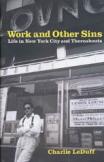Big Apple: Hold the Caramel
Journalism can be a difficult and tricky trade for those whose heads are on straight and whose hearts are in the right places.
It is hard to get past the people: those looking for decent housing; the immigrants who seem to hold so much of the rest of this country up on their brave and persevering shoulders, who just want their piece of this precious dream that so many take for granted; the people to whom life has dealt a bad hand, just trying to survive.
As much of mainstream journalism would have it, however, these people are somehow incidental. They’re the wrong color, they don’t make enough money, they’re not smooth enough. In the machinery of a money-obsessed society, they don’t even count as oil. So, inevitably, they’re overlooked.
But not by Charlie LeDuff, a reporter for The New York Times. He knows where the real people are and manages, sometimes miraculously, to find them. Work and Other Sins is a collection of pieces LeDuff has written for the paper since being brought on full-time in 1999. Many of them are reprints from his weekly column Bending Elbows, which few outside the New York boroughs ever saw. In the spring of 2000, LeDuff and Edward Keating, a photographer with a very fine eye, began visiting lots of bars, upscale, downscale and in between.
It wasn’t a society thing, or even nostalgia. There was strong and obvious respect for the inherent dignity all these seemingly incidental men and women deserved. They ring with beauty and truth, often in the thick of the squalor.
There are enough other pieces in this book, however, to remind you just how good a reporter LeDuff is. He spent a month working in a slaughterhouse in North Carolina as part of a Times series on How Race Is Lived in America, which won its writers a Pulitzer Prize in 2001.
It is clear he is no outsider, some smooth-handed guy from the suburbs, playing with the idea of hard, back-bending work. He knows what that is. He also knows things will skew along racial lines, but hepart Cajun, part Ojibweis an anomaly, which allows him to flow between the red and the brown and the black with the ease and wisdom of a shape-shifter.
The first thing you learn in a hog plant is the value of a sharp knife, he writes. The second thing you learn is that you don’t want to work with a knife. Finally you learn that not everyone has to work with a knife. Whites, blacks, American Indians and Mexicans, they all have their separate stations.
The piece goes on to tell, in language so plain and direct it makes you shiver, what it is like to have a clock job, where there’s nothing in it for you except when it’s break time or the end of day. Even thenLeDuff was therethe bosses will try to mess with workers: tell someone (the author) he’s not the right color to work on the cutting floor; reset clocks to cut down on break time. It was that sort of thing that LeDuff exposed, as many others have done to no avail: the abyss between job and vocation. We would all be better off if we had vocations, he seems to be saying, not just jobs.
There are other pieces, most of them short and tight, on everything from a visit from a friend’s mother (she hadn’t seen her son in a dozen years) to grief, in several forms, and a night hanging out with teenagers in Long Island. It’s not just the author’s ear, though. It’s where his heart and soul are. He knows, he really, really knows. You give respect, you get respect; dignity is to be assumed.
The most difficult part of the book for many may be LeDuff’s chronicling of the aftereffects of 9/11 on Squad 1 in Park Slope in Brooklyn. There are seven pieces, all written with a combination of concern and detachment that make it very hard to read them without crying, even though you don’t know any of these people.
But he understands the nature of faith and vocation. He knows what work is, too, and what it means to be a Catholic, not in the lofty sense so many do, but in the hands-on way people who work hard and sometimes dangerouslyfirefighters, police officers, those who slaughter what will end up as pork chops or bacondo.
The greatest value of Work and Other Sins is that it offers an in-your-face challenge to the artifice of journalistic objectivity. Most mainstream newspapers would rather have the poor, working and not, disappear. Poor people don’t read newspapers; why should we bother?
To its credit, The New York Times isn’t one of them. For all the silliness of its Styles section and fashion coverage, the paper knows its mission, which is not the engenderment of pity, but genuine enlightenment.
When the cocktail set tells me they enjoy the cast of losers, I never mind them, LeDuff writes in the introduction. I smile and drink their liquor. They don’t know work.
Oh, but this man does, deep, deep in his bones.
This article also appeared in print, under the headline “Big Apple: Hold the Caramel,” in the May 24, 2004, issue.








